|

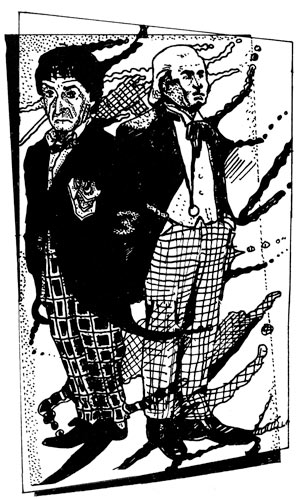
Image © Robin Craine,
1986
|
The Basics |
|
Place of Origin:
Pontefract, West Yorkshire, UK
Editors:
John Marsh and David Marsh
In
Production:
1984-86 |
Distribution Media:
Audio Cassette
Tape Lengths:
#1-5: C-90
Issues Produced:
5 |

“A lonely
figure walks on a lone, desolate planet, barren and sandswept.
The man walks towards the shining object lying in the sand.
He bends down to pick it up. It is a tape. UNIT Tapezine.”
UNIT Tapezine hailed
from the North of England and quite rightly celebrated the fact.
Brothers John and David Marsh of Pontefract, West Yorkshire, were at the
helm for the duration of UNIT’s life, which spanned five
90-minute issues between May 1984 and April 1986. They had grown up in a
household where Doctor Who was part of their way of life, as
David Marsh fondly remembers: “John and I are twins, and we were brought
up watching the show. We were often terrified, but refused to have the
TV turned off. It was just magic to us.”
John Marsh takes up the
story: “It was our dad that got us into Doctor Who initially. I
can vaguely remember parts of The Invasion with Pat Troughton,
particularly the Cyberman in the sewers. One Saturday, my dad said
there’s a new Doctor Who on tonight, which of course was Jon Pertwee, so
he was the one that I grew up with first. With its Earthbound stories
featuring the Brigadier, to me the show was about an eccentric man
fighting monsters on Earth every week. The Doctor going to other
planets, etc, had no bearing on it for me. I thrilled at the prospect
that there could be a Silurian under my very feet, or a Dæmon like Bok
lurking in a churchyard, and of course the Autons were always on hand in
Burton’s shop window, so I felt I was living in the very world of
Doctor Who. We were obsessed with it.”
In common with many of their
contemporaries, the brothers’ journey to producing their tapezine
started with another such title arriving in the post, as David reveals:
“John and I were intrigued by a tapezine called
The Logopolitan. We were new
to DWAS and fandom, so we sent off for the product. We liked the fact
that it was ‘home-produced’ and we enjoyed the format. We felt we could
at least manage something similar. With an outlet to air our opinions
and creativity, we were inspired. With the greatest respect to The
Logopolitan, had it been slick and highly polished to a professional
standard that could have aired on the radio, we might never have decided
to have a go ourselves.” John concurs: “It was no frills, just two fans
expressing their views and articles on a standard tape recorder – it was
unpretentious and we liked that. Keep it simple.”
John also recalls that they
didn’t consider an alternative medium for their fanzine: “It never
crossed our minds to do a printed fanzine, so it was never a case of
either / or. We realised that a tapezine was something we could do and
it would be cheap to produce.”
The cassette inlay of the
first issue of UNIT Tapezine carried the handwritten legend,
“Pertwee edition”, alongside a photograph of Nicholas Courtney as
Brigadier Lethbridge-Stewart. David explains the thinking behind the
decision to initially focus mainly on this one part of the series: “It
largely came from my brother – a massive Pertwee fan – hankering after
the halcyon days of an era that seemed long past. He also thought that,
with tapezines largely being clip-illustrated, he might have some
listeners offer some Pertwee audios to add to his (as then, tiny)
collection of recorded soundtracks! Pertwee was ‘our Doctor’, though I
had a particular fondness for Peter Davison, and still do – met the
bloke; he’s a gem.”
Speaking on the same
subject, John also noted his and David’s affection for the Pertwee era,
and went on to suggest that the tapezine’s name was itself very much
associated with that period of Doctor Who – and that this had
also inspired the debut issue’s theme.
The Marshes later met the
Third Doctor in person, as John relates: “Jon Pertwee came to Wakefield,
which is only 20 minutes from where I live. It was a very small
convention, probably only about 20 people attended, but it was very
intimate and we got to spend plenty of time with the great man. He
signed my Moon Boots and Dinner Suits book. He kept saying,
‘Where are the twins?’ so we made a bit of an impression on him. To say
we were thrilled is an understatement. He had a very strong grip with
his handshakes!”
Included on Issue 1 of
UNIT Tapezine were an original, self-contained drama entitled
Land of the Daleks and reviews of the UNIT Years, The Curse of
Peladon and Carnival of Monsters, as well as a combined
review of The Three Doctors and The Five Doctors. Further
stepping beyond the Pertwee era theme were a review of the 1960s Dalek
films and another that considered the then newly-arrived Sixth Doctor.
There were also interview excerpts from TV magazine programmes featuring
Colin Baker, Nicola Bryant and Anthony Ainley, and a feature in which
John revealed what he would do if he was Doctor Who’s producer.
However, the issue would be
blighted somewhat by technical gremlins: “I remember being excited by
the process of producing something we both considered as a kind of
‘album’, but we’re acutely aware that we had a few sound issues,” David
admits. “That wasn’t going to stop us – two enthusiastic Who fans
– getting our voices heard! We had two standard tape recorders. One was
used to record the vocals, and the other would play any effects or audio
clips – which were recorded externally with a plug-in mike – onto the
master tape. This high-tech stuff was all done in our bedroom!
Initially, duplicates of the master tape were made via a cable running
from one tape recorder to another. The internal ‘listening’ system of
the recorder making the copy was not brilliant as, in quieter moments,
the automatic ‘ear’ would raise the levels to try to pick up sound,
which caused a lot of hiss. We rectified the audio trouble in Issue 2
with new equipment and a machine that could copy tape-to-tape, which
basically copied exactly what was on the master tape without any auto
adjustment. We did, however, only charge 20p for that first issue (a 40p
charge was made for each of issues 2, 3 and 4, and 50p for Issue 5).
Orders were good, perhaps around fifty – I think we covered the
advertisement costs.”
The duplication of incoming
orders for Doctor Who fans tended not to interrupt John and
David’s work on new issues – particularly once they had upgraded to the
double-tape deck – as they were very well organised. David elaborates:
“All our articles were written weeks, if not months, before a new
edition was recorded so the impact of recording or tying up our
equipment fulfilling orders didn’t hinder us. We’d just write stuff
until our orders from the previous edition were fulfilled.”
While contemporary reviews
of Issue 1 did allude to the sound issues, the comments generally tended
to be framed constructively, and they didn’t seem to significantly spoil
anyone’s enjoyment, as John recalls: “Feedback from customers was
positive as far as I can remember. We knew we had to improve the sound
quality, although people seemed to be very forgiving.” David’s
recollections chime here, too: “Feedback was good: we seemed to be
considered a bit different to other products on offer – maybe it was the
northern accents. I remember one girl saying we had sexy voices!”
UNIT Tapezine quickly
built a reputation for its no-nonsense approach, and for being perhaps
more forthright and opinionated than most other tapezines. This was not
an intentional editorial choice, as David notes: “I’m not aware we
deliberately tried to be anything other than what we were. ‘Say it as
you see it’ was our motto.” John elaborates on the subject: “I don’t
think there was a conscious idea behind our more informal approach to
presenting UNIT, other than that we wanted to steer away from
‘intellectualising’ about the series. Our articles weren’t particularly
in-depth or analytical – we just said what we liked and didn’t like at
the time.”
The decision-making process
on UNIT was shared between the Marsh brothers. John casts his
mind back and considers how the tapezine ticked behind-the-scenes: “If I
remember correctly, it was mainly a joint editorship, although
ultimately I had the executive decision! I don’t recall any
disagreements as such. David would say he wanted to do a certain thing
or review and I would have my ideas, too. Over a 90-minute issue, I
think there was ample time to accommodate what we both wanted to
include. Any disagreements would appear in the conversations we had
within the issue itself, such as when I ‘toasted off’ the Peter Davison
era and David said after the article had finished that he disagreed and
thought Peter was good. My views about Davison were quite strong, but I
must confess I’ve warmed to his era since then. Other than that, David
and I were pretty much on the same hymn sheet.”
David, similarly, recalled
no great problems surfacing during the planning and recording of UNIT:
“The dual editorship seemed to run smoothly as I recall. I did most of
what tech work was involved, such as putting clips and articles together
onto the master tape. The running order of articles was largely down to
the balance and sound of the finished edit. Usually we’d alternate
articles, later interspersed with Robin Craine and Paul Martin’s
contributions, so it didn’t sound overly weighted, with the same voices
dominating the ’zine.”
“Robin was a customer of
UNIT [who wrote into the letters section, Brigadier’s
Battleground] and he seemed to enjoy the first edition. He had been
attracted by the home-produced story Land of the Daleks, which he
said boasted a ‘stunning impersonation of Jon Pertwee’,” David
remembers. “Robin was interested in writing fan fiction and, with his
friend Paul, asked if he could supply material and maybe the odd
article. We were happy to oblige him, as it gave us less to think about
and we were happy to have him on board. He had a great voice for audio,
softer than our accents, and we thought he complemented the overall
sound and balance of the ’zine very well.”
Based on the Isle of Man,
Robin and Paul would send their material on cassette to the Marsh
brothers in Pontefract. They worked quickly, producing an original audio
drama – The Rebellion on Quaras – in time for it to be included
in UNIT Tapezine Issue 2 (August 1984), and the pair would go on
to contribute further stories as well as review features. Robin recalls
how they put their recordings together: “Paul and I weren’t blessed with
a Big Finish recording studio – in our situation, it was two lads, a
creaky old tape recorder with single mic and a trusty BBC sound effects
LP. Ha! But, we did have quite a bit of enthusiasm – it was fun at the
time to be entering the heady world of Doctor Who fandom.”
Robin and Paul went on to
produce two further two-part audio dramas for UNIT, and these
were included on Issue 3 (The Space Fugitive Part 1), Issue 4 (The
Space Fugitive Part 2 / The Vengeance of Grezal Part 1) and
Issue 5 (The Vengeance of Grezal Part 2). A further story, The
Ultimate Conquest, was planned for Issue 6, but was, ironically,
ultimately not produced.
The third issue, released in
December 1984, included a piece that John wrote and remembers fondly: “I
think my favourite article for UNIT was my review of The Sea
Devils, even though I kept mispronouncing Roger Delgado’s surname!
I’d recently received the full audio of the serial (those were the days
when Doctor Who audios were a big thrill!), so I was actually
reviewing it from the audio and also from my memories as a
seven-year-old!”
An announcement was made in
Issue 3, in which listeners were given notice that the scope of UNIT
Tapezine would be widened to include series other than Doctor Who.
On the tape, David explained why they had arrived at this decision: “The
reason why this change is occurring is because when your spare time is
taken up by Doctor Who only, you tend to get a little bit stale,
talking about the same subject. It’s to make life more tolerable for us
and to provide a bit of variety for you. The tapezine will still be
called UNIT, because we’ll still be 90 per cent Doctor Who-orientated.
UNIT 4 will probably have a different theme tune and a different
format.” The first taste of this innovation followed directly after the
announcement – an archive feature about the Star Trek episode
The Galileo Seven.
On each of the subsequent
issues, a single feature was devoted to a non-Doctor Who subject,
with Robin Craine reviewing The New Avengers – Cat Amongst the
Pigeons in Issue 4 and Simon Urquhart taking a look at the debut
episode of Blake’s 7, The Way Back in Issue 5. The
promised new theme did arrive, replacing a selection from Peter Howell’s
score to The Leisure Hive, which was much favoured by tapezine
producers. Also, another innovation from Issue 4 onwards was the
inclusion of background music to articles. Some Doctor Who
incidental tracks had been used occasionally in the first three issues,
whereas the music going forward was more from rock and pop sources.
During the production of the
fourth issue, John was also working on an off-shoot tapezine entitled
The Jon Pertwee Special (or, as he said, “Give My Regards to
Pertwee”). This was fully written and the first side had been recorded
but after being announced on Side 1 of UNIT Tapezine 4, the
project was abandoned and listeners were advised of this fact on the
other side of the same issue. John explains the tragic circumstances
behind the decision not to continue with it: “The mooted Pertwee special
didn’t materialise mainly because our uncle had been killed abroad and
it resulted in our aunt coming to live with us – and so privacy was at a
premium. In any case, I forgot about it leading up to Issue 5.”
The fifth issue proved to be
the end for UNIT Tapezine, not that it was intended to be so,
although John and David had planned to step down after finishing its
production. This was, as John explained on Issue 5, because “work
pressures have got the better of us and our once beautiful pastime of
UNIT Tapezine-making has now had to come to close and it’s so very
sad.”
The previously mentioned
family tragedy and its repercussions played a part in John and David’s
decision to retire, but there was more to it as John reveals: “As far as
Issue 5 was concerned, I think we had a couple of other contributions
from ‘fans’ [Simon Urquhart and Julian Burt]. At the time, we were in
the process of starting up our own decorating business, so we weren’t as
‘hands on’ as we were initially, and we handed the reigns over to Robin
Craine to become the new editor. Robin was very enthusiastic about
UNIT, but I’m not really sure why we didn’t produce any more
together. I don’t think we decided on a final ‘hurrah’ – it was just a
case of putting it on the back burner and then not returning to it,
really.” David tends to agree: “I don’t think there was a conscious
decision to call it a day. Even now, my brother occasionally suggests a
reboot!” [Bring it on! Ed.]
“Paul and I took over
duplication and distribution for Issue 5,” says Robin Craine, “and then
we were to assume the editorial post from Issue 6. We even recorded a
‘regeneration scene’ for the handover of editorship and this appeared at
the end of Issue 5. However, we had got so much into writing the
fiction, our 15-year-old fanboy mindsets decided the world of tapezines
wasn’t enough – we wanted to write proper Doctor Who for
television. So, with dreams of television work, convention invites, you
name it, UNIT edition 6 hastily went into the ‘pending’ tray
(it’s probably still there) and the brand vanished overnight.”
Looking back, John and David
both hold a great nostalgia for the days of UNIT Tapezine. John:
“Yes, I do remember those times fondly, not least because we became
friends with Robin, although we haven’t been in touch for ages now.
Producing a tapezine felt to me a little bit like being in a pop band or
something and each new issue was our current album! Good fun.” David:
“Very happy days. We made good friends, it was never a chore, and our
audio collection grew massively, mainly thanks to a wonderful and
generous guy called Alan Disdale.” Alan was involved in the North Essex
Local Group in the 1980s and was hugely enthusiastic about Doctor Who
and Cult TV in general. Sadly, he contracted asbestosis at work and
died, much too young, in 1993.
But are John and
David still Doctor Who fans? John is undecided... “Yes and no.
Visually, it’s better than it ever has been, and, when Chris Eccleston
took over, I thought it was great, and so too for the first couple of
David Tennant’s seasons. After that, I think that it got too ‘up
itself’, with so much complex foreshadowing of events and technobabble
that I lost the plot. I’ll always watch it because it’s in my blood, I
suppose.” David, meanwhile, isn’t so sure... “I still watch, but
sometimes I wonder if it’s more to do with loyalty than anything else. I
think there’s a massive overuse of the Sonic, so I’d say plenty about
that if UNIT was still running!”

The first issue of UNIT
Tapezine included an interesting opinion piece by John Marsh in
which he stated what he would do were he to take over from John
Nathan-Turner as producer of Doctor Who: “My first action would
be to produce less stories, with more money being spent on each, like
with the Pertwee era. I’d do much more location work, with some done on
film. The story Kinda would have been much better visually if it
had been done on location in a forest – and on film. Even though the
sets were okay, they weren’t very convincing. I’d also aim to bring back
the scary parts, even if it means terrorising little kids and abuse from
Mary Whitehouse. Doctor Who got its highest-ever ratings in the
Pertwee and early Baker years because of the horror impact. There would
have to be more horror and guts in the productions as well as
intelligent scripts – the scientific gobbledegook would have to be cut
to a minimum. I’d cut the guest star policy because, in my view, the
guest stars make the programme less science-fictionesque. For example,
Beryl Reid, Rodney Bewes and Rula Lenska, etc, are too easily
identifiable as themselves, and don’t look from other timezones or
worlds at all... And as for the character of the Doctor, I’d pick a
relative unknown, like Tom Baker was. I think John Nathan-Turner made a
mistake in picking Peter Davison because his face was too familiar to be
an alien. However, I thought Peter played the part as best as he could.
The monsters would be much more violent and scary – no slow-moving
things like those dreadful impersonations of Silurians, Sea Devils and
even the Myrka in Warriors of the Deep. The monsters would
definitely be a challenge to the Doctor. While we’re on the subject of
monsters I’d let the Daleks go as I think they’re out of date and too
slow moving. They’re hardly a threat if all you have to do is spin them
around or cover their eyes to defeat them. I’d probably only make four
adventures a season, actually, but of the highest quality, to bring back
lost viewers, aiming for the 10-12 million mark. This could mean putting
the show on at a later timeslot. The arguments against this are, if you
did this, then the younger viewers would miss it and you’d lose the next
generation of fans. This is unlikely, really, as most younger viewers
watch plenty of horror on videos and violence on The Professionals,
which is on at about nine o’clock, and Minder. There is no
denying that these are popular with children. Anyhow, these views are my
own – and no one else’s – and they are what I’d do if I became producer
of Doctor Who.”

The Tapezines in Focus
section of The Logopolitan Issue 2 (June 1984) included a brief
review by Michael Flint of the debut issue of UNIT Tapezine: “UNIT
is very cheap, apparently due to the hiss on the tape which doesn’t
spoil my enjoyment at all. They tend to do a lot of reviews and these
include The Twin Dilemma, clips of which don’t come out too well.
They also review the two anniversary stories, The Three– and
Five Doctors very well, and they also include interviews with the
new Doctor, from the television. Anyway, John and David Marsh, whose
voices I can’t tell apart, have a lot of potential and enthusiasm.”
UNIT Tapezine Issue 2
(August 1984) included some letters from various listeners, giving their
reactions to the tapezine’s debut issue...
“I quite enjoyed UNIT, except for the
tape quality… which was poor. Your story, Land of the Daleks, I’m
afraid I found boring. Perhaps you ought to do a comedy sketch like [WOTAN’s]
Fingers and the Doctor. Comedy, it seems, is much more popular.
We should know, as we’ve had serious stuff like Land of the Daleks
slammed.”
David Myers, WOTAN
“As for Land of the Daleks, I found
that you were using some dialogue from Genesis of the Daleks and
some clips of the Daleks [from Destiny of the Daleks], but other
than that I could not help laughing at your not very good story – which
I really liked.”
(Listener’s name not announced)
“I thought Issue 1 was a very competent first
issue. There were some very good articles in it. I especially enjoyed
the Three Doctors and Five Doctors review and your Season
Poll. The tape noise didn’t spoil my enjoyment particularly and I look
forward to Issue 2.”
Geoffrey Connal, CVE Tapezine
“I have just finished listening to UNIT
Tapezine and found it very good. I was glad to hear so much material
from the programme itself. I enjoyed listening to your tapezine. It’s a
shame about the tape noise and the hissing and background noise, but
it’s a good ’zine.”
Andrew Johnson
Commenting in The
Tapezine Zone section of Zero Room Audiozine Issue 7 (April 1985),
David Balston delivered his verdict on the first three issues of UNIT
Tapezine: “Issue 1 was a bit of a let down. It was proclaimed as a
“pioneer in brilliant tapezines,” but was of a continual poor quality.
It is edited by John and David Marsh and is introduced with the music
from The Leisure Hive, which has a habit of cropping up in quite
a few tapezines. Regular features include The Brigadier’s
Battleground, which features reviews and letters, and Greyhound
One, where merchandise and exhibitions are reviewed. The Dalek films
were reviewed, unfortunately without a script – apparently [the writer]
lost it. UNIT 2 was a great improvement: in fact it was quite
well produced. However, in the Davison Years features it was obvious
that the author didn’t like them at all and it was all very unfair.
There was also an attack on Mary Whitehouse and it was suggested that if
people don’t like something, then why don’t they turn off? A good point,
but in the ever-continuing ratings battle, surely the BBC are more
interested in people turning on? The home-produced play, The
Rebellion on Quaras, was again very difficult to hear and didn’t
sound very good anyway. UNIT 3 was much the same formula, only
with the introduction of science fiction outside Doctor Who, with
a retelling of The Galileo Seven, a Star Trek episode.”
UNIT Tapezine later
received a one-line review from Roy Stevens on The Master Tape
Issue 6 (June 1988): “UNIT Tapezine, although in stereo, does
plod along a bit.”
Death Zone Issue 2
(August 1989) included a brief review of UNIT Tapezine, with
Keith Musselwhite looking back to the early days of tapezines: “UNIT
seemed to concentrate on stories that had either been released on
record, like Genesis of the Daleks, or stories that had been
repeated within the last six years or so, so that meant they had nothing
unheard of, clips-wise.”

David Marsh works for
the University of Leeds, where he is surrounded by books! He is also a
photographer and part-time writer and has co-authored two books with
John Edwards and Christopher Allen: Leeds – The Postcard Collection
(2014) and Secret Leeds (2017), both from Amberley Publishing.
His first novel,
Flesh and Blood, was issued by Pegasus Publishers in November
2023. For many years, David has also been involved in amateur dramatics
for the Carleton Theatre Group, Scireburnean Theatre Group, Brotherton
and Byram Entertainers, and St Giles and St Mary’s Pantomime Society,
both acting in and directing plays. He often performs in these
productions with his brother John, but both have occasionally guested
individually for other theatre groups in the area which sometimes
struggle to attract male performers. He has a keen interest in local
history, and a special fondness for his home town of Pontefract,
particularly its 11th century castle.
John Marsh has been
involved in amateur dramatics for something in the region of thirty
years. He has featured in productions for many theatre groups during
that time, in roles great and small, though he admits: “Most of the
plays tend to blend into one memory really, but I remember in one play I
had to pull a gun from out of my inside pocket and it got stuck!
Eventually it came free but it seemed like an eternity to me! I’ve done
a couple of Shakespeares with Carleton and vowed never to do another
one. I find him very difficult to learn.” His first role was as Eric
Birling in An Inspector Calls for the Carleton Theatre Group in
Pontefract, a production which garnered favourable write-ups in the
local press, complete with photographs – “I felt like a minor
celebrity!” says John. He is also a member of two pantomime societies,
generally playing the fool roles or appearing with his brother as a
comedy duo. Professionally, he has worked in warehousing and is now a
dog walker.

Of all the Doctor Who
tapezines produced, UNIT Tapezine was perhaps the most
distinctive. It would be fair to say, though, that it wasn’t the most
analytical ’zine, and that equally it wasn’t the most slickly recorded,
but the Marsh brothers’ ‘say it as you see it’ approach was without a
doubt refreshing, unpretentious and welcome. If John and David weren’t
keen on something, you’d know they weren’t keen on something, and
they didn’t slather their opinions in sugary, overly conciliatory words.
While this sometimes meant that the criticisms made weren’t as
constructive or clearly reasoned as they might possibly have been, they
were at least wholly honest, unvarnished and sometimes deliciously
blunt. This was quite different to the approaches taken by most of
UNIT Tapezine’s contemporaries, something which made the ’zine very
appealing to listeners. John and David, as heard on the tapes, were true
characters – entertaining, engaging, and full of opinions that they were
not afraid to share. Their love of Doctor Who burst through the
speakers in each and every issue, as did their brotherly respect and
affection for each other. The recording quality, particularly in the
early issues, was not without the odd problem, but to concentrate on
hiss and odd acoustics would be missing the point of an entertaining,
straight-talking tapezine that had a lot going for it. It’s a real shame
that UNIT ended just as it was about to start a new era, flitting
off to the Isle of Man to be edited by Robin Craine. You have to wonder
just how UNIT would have been without John and David at the wheel
– probably it would have been very different, and perhaps leaving it at
those five issues, with those two great, characterful fans at its heart,
was – in the end – the best course. You can take UNIT Tapezine
out of Yorkshire, but perhaps it was a bad idea to take Yorkshire out of
UNIT Tapezine!
Alan Hayes

|
UNIT
TAPEZINE – ISSUE 1:
PERTWEE EDITION
May 1984, C-90
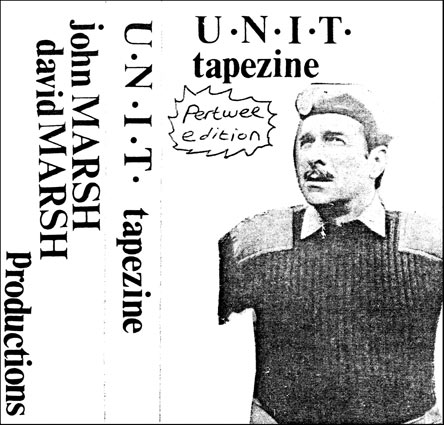
Side A:
-
Introduction by John Marsh
-
Excerpt: The Sea Devils
-
Review: The Curse of Peladon by David Marsh
-
Brigadier’s Battleground: Reviews of The Logopolitan 1 and
Skaro
-
Excerpt: BBC Breakfast Time with Colin Baker, Nicola Bryant
and Selena Scott
-
Review: The Twin Dilemma / The Sixth Doctor by John Marsh
-
Review: The Three Doctors and The Five Doctors by
John Marsh
-
If I Were Doctor Who’s Producer by John Marsh
-
Drama: Land of the Daleks by John Marsh and David Marsh
(3rd Doctor)
Side B:
-
Greyhound
One: Doctor Who Merchandise by John Marsh
-
Review:
The 1960s Dalek Films by John Marsh
-
Excerpt:
Saturday Superstore with Colin Baker, Nicola Bryant,
Anthony Ainley and Mike Read (BBC, 17.3.1984)
-
Excerpt:
Nationwide – Peter Davison, Jon Pertwee and Patrick
Troughton with Sue Lawley (17.3.1983)
-
How We
Voted in the DWAS Season 21 Poll by John Marsh and David Marsh
-
Review:
The UNIT Years
-
Review:
Carnival of Monsters by John Marsh
-
Season 21:
Our Reasons for Voting How We Did by John Marsh
-
UNIT
Tapezine 1 Sign Off by John Marsh
UNIT
TAPEZINE – ISSUE 2
August 1984, C-90
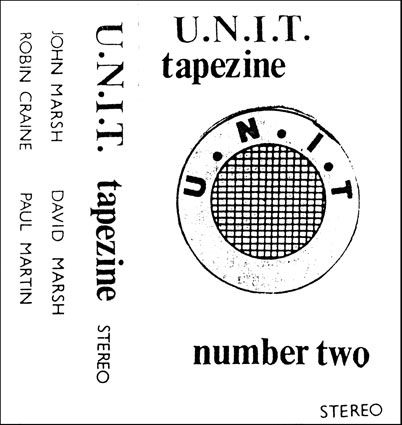
Side A:
-
Introduction by David Marsh
-
Excerpt: Genesis of the Daleks
-
Brigadier’s Battleground: Reviews of House of WOTAN tapezine
and Marvel Comics Summer Special plus Readers’ Comments on UNIT
Tapezine 1 by John Marsh
-
Review: The Peter Davison Years (Part 1) by John Marsh
-
Review: Target Books by David Marsh
-
Greyhound One: A Look at the Doctor Who Exhibition in
Blackpool by John Marsh
-
Drama: The Rebellion on Quaras by Robin Craine and Paul
Martin
-
Review: Genesis of the Daleks, Destiny of the Daleks,
and Resurrection of the Daleks by John Marsh
-
Excerpt: Look North with Peter Davison (BBC1 Yorkshire,
25.4.1984)
Side B:
-
Excerpt: Take Two with John Nathan-Turner (BBC1, 23.5.1984)
-
Review: The Twentieth Anniversary Radio Times Special /
The Five Doctors Radio Times by Robin Craine
-
Review: The Peter Davison Years (Part 2) by John Marsh
-
Review: The Robots of Death by David Marsh
-
Review: Doctor Who Magazine’s Fifth Doctor Article by John
Marsh
-
Brigadier’s Battleground Extra: Readers’ Comments on UNIT
Tapezine 1 from David Myers, Stephen Bunce, Geoffrey Connal,
Andrew Johnson and Andrew Barr, read by John Marsh and David Marsh
-
A Look at The Master by John Marsh
-
John Nathan-Turner’s Guest Star Policy by John Marsh
-
UNIT Tapezine 2 Sign Off
UNIT TAPEZINE – ISSUE 3
December 1984, C-90
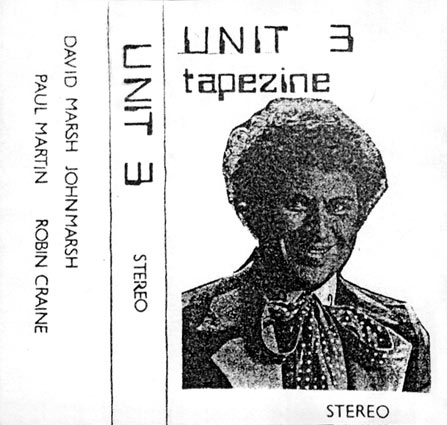
Side A:
-
Introduction by David Marsh
-
Excerpts: Logopolis, The Time Warrior, The Krotons,
Carnival of Monsters and An Unearthly Child
-
Greyhound One: The Doctor Who Annuals of 1965, 1973, 1974 and
1985 by Robin Craine and Paul Martin
-
Review: Season 9 by John Marsh
-
Review: The Leisure Hive Convention (4-5.8.1984) by Paul Carson with
interviews with Mark Strickson and John Levene and guest panel
excerpts featuring John Levene, Michael Wisher and Pennant Roberts
-
Review: The Sea Devils by John Marsh
-
A Complaint About Cheapo Tapes by David Marsh
-
Brigadier’s Battleground: letters from Glen Cooper, Willie Miller,
John Slater, Nick Goodman and Andrew Barr, read by John Marsh
Side B:
-
Drama: The Space Fugitive – Episode 1 by Robin Craine and
Paul Martin
-
Review: The Caves of Androzani by David Marsh
-
Excerpt: Saturday Superstore with Peter Davison, Janet
Fielding and Mark Strickson (BBC1, 26.3.1983)
-
UNIT Tapezine News – Changes Coming to UNIT by David
Marsh
-
Archive: Star Trek – The Galileo Seven by David Marsh
-
UNIT Tapezine 3 Sign Off by John Marsh
UNIT
TAPEZINE – ISSUE 4
July 1985, C-90
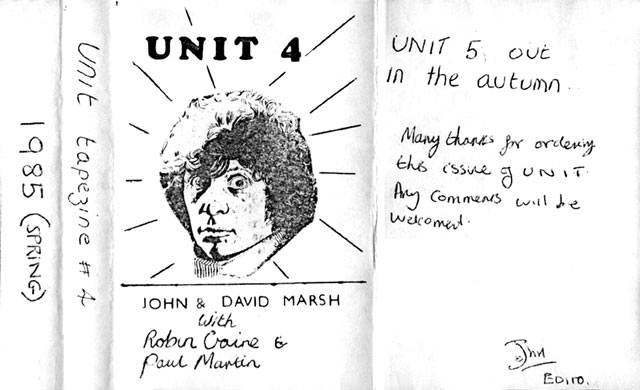
Side A:
-
On A Lone,
Desolate Planet... by David Marsh
-
Introduction
by David Marsh
-
Review: The
Sontaran Experiment by David Marsh
-
Commercial:
The Jon Pertwee Special (mooted tapezine) by John Marsh with
David Marsh
-
Review:
Kinda and Snakedance by John Marsh
-
Doctor
Who in the Society by David Marsh
-
Drama:
The Space Fugitive – Episode 2 by Robin Craine and Paul Martin
-
Brigadier’s
Battleground: letters from James Calcun Jr., Karen Beech, Nick
Goodman and Mark Strong, read by John Marsh
Side B:
-
Greyhound
One: The Doctor Who Annuals of 1967, 1975, 1976 and 1984 by
Robin Craine, John Marsh and Paul Martin
-
Review/Archive: The New Avengers – Cat Amongst the Pigeons
by Robin Craine
-
Reading:
Extract from Moon Boots and Dinner Suits by Jon Pertwee,
read by David Marsh
-
Review:
Moon Boots and Dinner Suits by John Marsh
-
Comment:
The Cancellation Crisis and Season Poll Choices by John Marsh
-
Apology:
The Jon Pertwee Special cancelled by John Marsh with David
Marsh
-
Drama:
The Vengeance of Grezal – Episode 1 by Robin Craine and Paul
Martin
-
UNIT
Tapezine 4 Sign Off by John Marsh
UNIT
TAPEZINE – ISSUE 5
April 1986, C-90
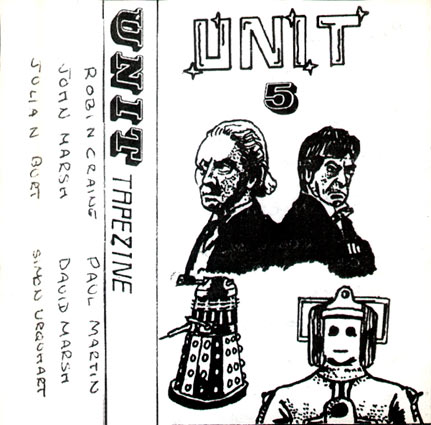
Side A:
-
Introduction by John Marsh
-
Book Review: John Nathan-Turner’s TARDIS Inside Out by John
Marsh
-
Review: The Gunfighters by Simon Urquhart
-
Review: Myth Makers – Michael Wisher, John Leeson and
Nicholas Courtney by Paul Martin
-
Brigadier’s Battleground: letters from Jason Jackson and Daniel
Denman
-
Review: Blake’s 7 – The Way Back by Simon Urquhart
Side B:
-
Review: The Invasion by Robin Craine
-
Review: The Space Museum by Julian Burt
-
Merchandise Review: The Sevans Dalek by John Marsh
-
Announcement: Stepping Down from Editing UNIT Tapezine by
John Marsh and David Marsh
-
Drama: The Vengeance of Grezal – Episode 2 by Robin Craine
and Paul Martin
-
UNIT Tapezine 5 Sign Off and Farewell by John Marsh and
David Marsh
-
The Editors Regenerate by John Marsh, David Marsh and Robin Craine
|
|



